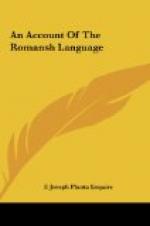This whole country, however, from its central situation, could not but be annumerated to one of the provinces of the empire; and accordingly we find that Rhaetia itself (which by the accounts of ancient geographers[W] appears to have extended its limits beyond the lake of Constance, Augsburg, and Trent, towards Germany, and to Como and Verona towards Italy) was formed into a Roman province, governed by a pro-consul or procurator, who resided at Augsburg; and that when in the year 119, the Emperor Adrian divided it into Rhaetia prima and secunda, the governor of the former, in which the country I am now speaking of must have been comprized, took up his residence in two castles situated where Coire now stands, whilst the other continued his seat at Augsburg. But notwithstanding these appearances, no trace or monument of Roman servitude is to be met with in this district, except the ambiguous name of one mountain,[X] situated on the skirts of these highlands, and generally thought to have been the non plus ultra of the Roman arms on the Italian side.
From the difficulty those persevering veterans experienced in keeping this stubborn people in awe, I mean to infer that such strenuous asserters of their independence, whom the flattering pens of Ovid and Horace represent as formidable even to Augustus, and preferring death to the loss of their liberties,[Y] favoured by the natural strength and indigence of their country, were not very likely to be so far subdued by any foreign power inferior to the Roman, as to suffer any considerable revolution in their customs and language: for as to the irruptions of the Goths, Vandals, and Lombards, in the fifth and sixth centuries, besides a profound silence in history concerning any successful attempt of those barbarians upon this spot, it is scarce credible, that any of them should have either wished or endeavoured to settle in a country, perhaps far less hospitable than that which they had just forsaken, especially after they had opened to themselves a way into the fertile plains of Lombardy.
Some stress must be laid upon this inference, as the history of what befel this country after the decline of the Roman empire is so intimately blended with that of Suabia, the Tyrolese, and the lower parts of the Grisons, which are known to have fallen to the share of the rising power of the Franks, that nothing positive can be drawn from authors as to the interior state of this small tract. The victory gained in the year 496 near Cologn, by Clovis I. king of the Franks, over the Alemanni, who had wrested from the Romans all the dominions on the northern side of the Alps; and the defeat of both Romans and Goths in Italy, in the year 549, by the treacherous arms of Theodebert king of Austrasia, whose dominions soon after devolved to the crown of France, necessarily gave the aspiring Merovingian race a great ascendency over all the countries surrounding the Grisons; and accordingly we find, that




